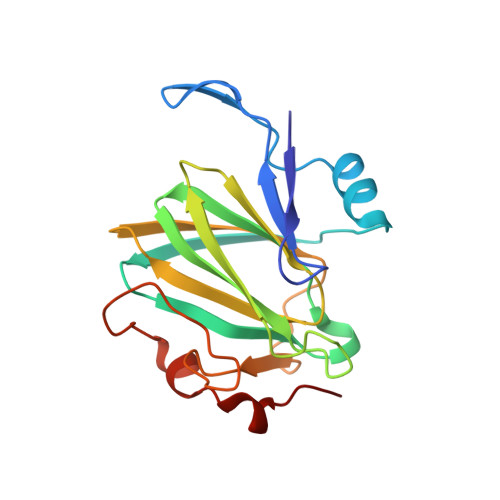Rmlc, the Third Enzyme of Dtdp-L-Rhamnose Pathway, is a New Class of Epimerase.
Giraud, M.F., Leonard, G.A., Field, R.A., Berlind, C., Naismith, J.H.(2000) Nat Struct Biol 7: 398
- PubMed: 10802738
- DOI: https://doi.org/10.1038/75178
- Primary Citation of Related Structures:
1DZR, 1DZT - PubMed Abstract:
Deoxythymidine diphosphate (dTDP)-L-rhamnose is the precursor of L-rhamnose, a saccharide required for the virulence of some pathogenic bacteria. dTDP-L-rhamnose is synthesized from glucose-1-phosphate and deoxythymidine triphosphate (dTTP) via a pathway involving four distinct enzymes. This pathway does not exist in humans and the enzymes involved in dTDP-L-rhamnose synthesis are potential targets for the design of new therapeutic agents. Here, the crystal structure of dTDP-6-deoxy-D-xylo-4-hexulose 3,5 epimerase (RmlC, EC5.1.3.13) from Salmonella enterica serovar Typhimurium was determined. The third enzyme of the rhamnose biosynthetic pathway, RmlC epimerizes at two carbon centers, the 3 and 5 positions of the sugar ring. The structure was determined by multiwavelength anomalous diffraction to a resolution of 2.17 A. RmlC is a dimer and each monomer is formed mainly from two beta-sheets arranged in a beta-sandwich. The structure of a dTDP-phenol-RmlC complex shows the substrate-binding site to be located between the two beta-sheets; this site is formed from residues of both monomers. Sequence alignments of other RmlC enzymes confirm that this region is very highly conserved. The enzyme is distinct structurally from other epimerases known and thus, is the first example of a new class of carbohydrate epimerase.
- Centre for Biomolecular Sciences, North Haugh, The University, St. Andrews, Fife KY16 9ST, Scotland.
Organizational Affiliation:




















